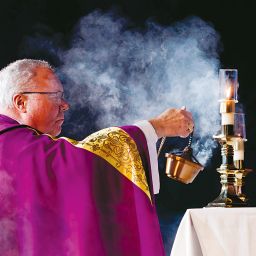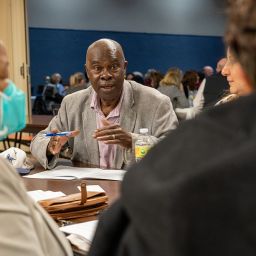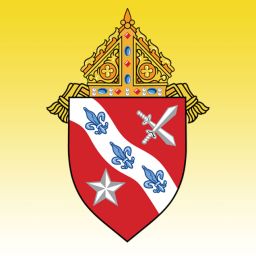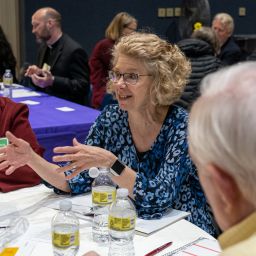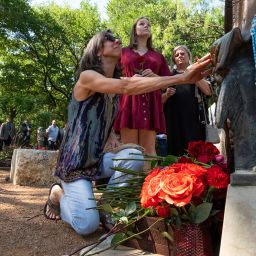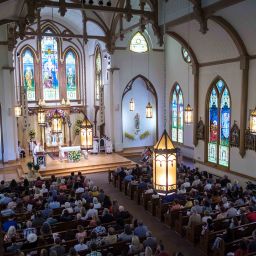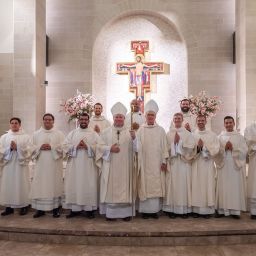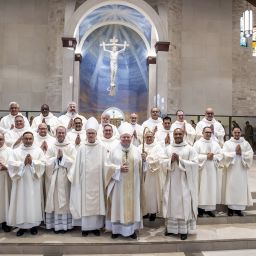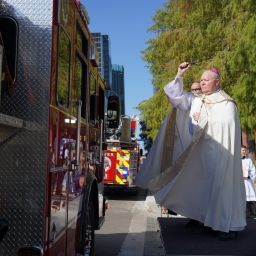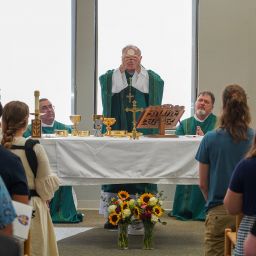
By Michael Gresham
The Texas Catholic
More than 300 people gathered Aug. 20 at Bishop Lynch High School to dialogue about Catholic social and moral teaching as well as the Church’s role in the world. The discussion was the latest in a series of listening sessions held as part of the preparatory phase of the Diocese of Dallas Synod.
“The listening sessions are how the bishop has asked the faithful in our diocese to participate in our synodal process,” said Lacy de la Garza, who serves as the chair for the synod preparatory commission. “By attending, sharing your experience and your perspective, and learning from those at your table, we will continue to build community as we work towards finding solutions to the concerns we share about our diocese.”
De la Garza said the resolutions that are voted on at the synod assembly in 2024 will be derived from the comments given at the tables during listening sessions.
“We need your participation,” she said.
The next synod listening session is scheduled Oct. 29 at a yet-to-be determined site. The topic for that listening session will focus on Non-Practicing Catholics and Non-Catholics Dialogue and Outreach.
“We want perspectives not only from those who are involved with the Church but also want to hear the experiences of those who are not or who are no longer involved with the Church,” de la Garza said of the topic for the upcoming session. “Their lived experiences of encounters, events, or situations that have led to them not engaging with the Catholic faith are things that we as a collective Church need to understand.
“This will help us to understand where they are coming from, but also give us information that can lead to changing some of those situations or scenarios,” de la Garza added. “We are not changing and cannot change any Church doctrine, but there are many things that can be done to change how one encounters the faith through proper administration or critical formation of our faithful.”
At Bishop Lynch on Aug. 20, participants discussed topics such as the beauty and blessing of marriage, same-sex attraction and gender identity issues, how the Church helps those who are economically disadvantaged, pro-life issues, and incorporating the corporal and spiritual works of mercy.
Bishop Edward J. Burns, who has attended each of the listening sessions, answered questions from participants at the end of the session. First, he spoke on the vital role the listening sessions play in the synodal process, praising those who are taking part.
“It is amazing the amount of information that has been coming from these sessions,” Bishop Burns said. “It is from these sessions and the raw data gathered that I will be able to get a sense of what is needed to formulate the resolutions that will be considered.”
The bishop added that he is able to witness the fruits of these sessions because he already has seen the fruits of the diocese as a whole.
“I’ve seen those fruits in so many wonderful ways,” Bishop Burns explained. “I’ve seen them through the wonderful parishes we have, the wonderful priests we have, the religious and the faithful of our diocese. The people in this diocese are proud to be Catholic. They want to express and live out their Catholic faith in a much more fulfilling way and a much more dramatic way. That is the goal of this synod, too.”
In answering questions about the topic of the day, the bishop acknowledged how difficult it can be for Catholics to live out their faith in today’s society.
“We grapple with real life experiences and how it is we apply our faith to those experiences,” Bishop Burns said. “We have to grapple with what is right and just. We have to also grapple with what is true. Through it all, we have a responsibility to proclaim God’s message. It’s always our goal to recognize the word of everlasting life and the truth — and to embrace it.”
Ultimately, Bishop Burns said one goal of the day’s session as well as future synodal sessions was to help the diocese do whatever it can do to bring people to Jesus Christ and to bring Jesus Christ to the people.
“Jesus Christ, our Lord, left us the great gift of himself in the sacraments. It is important that they encounter Jesus Christ in a very real way — through the sacraments and through the celebration of Mass,” Bishop Burns said. “This synod is going to be very key in helping us to determine how we can remove the obstacles that prevent people from coming into contact with our lord, Jesus Christ.”
To register to attend Oct. 29 or any future listening sessions, visit www.cathdal.org/synod. Volunteer opportunities for future sessions are also available.

